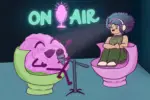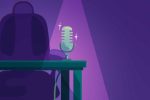Picture this: matching lab coats draped across the back of two stiff chairs with one ominous microphone secured on the table. Titi Shodiya and Zakiya Whatley lean into the black microphone, as they begin to spill witty and insightful commentary on the most infamous time of the year: cuffing season. Lucky for us, Spotify recently gave life to this scene with the latest edition to the podcast multiverse, “Dope Labs.”
“Dope Labs” is a brand spankin’ new podcast that combines trashy internet culture with scientific reasoning. But don’t let the s-word frighten you; “Dope Labs” is more than a re-envisioned idea of how science and the real world relate. It is also a ginormous leap forward in diversifying Spotify’s podcast culture. So, grab your safety goggles and have Urban Dictionary opened, because hosts Shodiya and Whatley are crafting a crackly chemical reaction.
BFF hosts Shodiya and Whatley are not just spitting scientific facts out their behind. Shodiya has a doctorate degree in mechanical engineering and materials science and Whatley has a doctorate in genetics & genomics and cellular & molecular biology. The dynamic duo has been inseparable since meeting at Duke University in 2011. They both found similarities between their experiences as black women in America, and their bond is tangible to listeners; it feels like you are at a chill hangout with close friends.
The refreshing and trendy topics on “Dope Labs” include cuffing season, hair restoration, ASMR and the most popular astrological events, such as Mercury’s retrograde, making it such a relatable podcast across all ages.
In an interview with Elle, Shodiya said, “It’s just that a lot of people weren’t given access to science in ways that were acceptable for their brains. We’re going to be showing the intersection between science and pop culture, making it really fun and relatable and accessible to everyone.”
“Dope Labs” is breaking more barriers than just the unanimous distaste of science. Out of 18,000 applicants, Shodiya was chosen as one of three winners in Spotify’s Sound Up Bootcamp. This win earned her $10,000 to fund the proposed podcast: “Dope Labs.”
Spotify’s Sound Up Bootcamp was a successful effort to crank up the volume for female voices of color. Out of the initial 18,000 applicants, 10 were chosen to participate in daily sessions with podcasting veterans Rekha Murthy and her colleague, Graham Griffith, over the course of a week. Imagine a prestigious, challenging and captivating 400-level “Intro to Famous Podcasting” course taught by the pros. From those 10 finalists, three were crowned winners of the nationwide and year-long search, Shodiya being one of them.
Spotify’s Sound Up Bootcamp was an ingenious idea aimed to help balance out some startling statistics. On the production end, 85 percent of American podcasts have at least one white host and only 22 percent of podcasts are hosted by women, and even fewer when it comes to minority women. The consumer stats are also off kilter as just 36 percent of podcast listeners are non-white. Just for reference, in 2018, 44 percent of Americans have ever listened to a podcast that’s equal to 124 million people!
These stats are the evidence of the lack of diversity in race and gender in the industry that is beckoning to be on front lines of change. The success of Spotify’s Sound Up Bootcamp has helped bring a new wave of empowerment to women of color. Podcasting is still young and therefore flexible enough to acclimate to fresh voices ready to power on their mics. The fight for a more balanced podcast environment is worth continuing in order to reach that percentage of listeners left untouched.
Being a driving force in the effort to amplify minority voices on the podcast scene, “Dope Labs” is also an inspiring woman in the STEM field. According to Tito, “In the scientific community, the voices of minority women are not amplified as much as they should be. When you think about the most prominent woman of science, within mainstream media, it’s hard to think of anybody.”
There are currently only a handful of science podcasts hosted by women, and the number dwindles when you search: “science podcasts hosted by women of color.” “Dope Labs” is engineering an essential category currently MIA in the podcast community.
“Dope Labs” runs on a biweekly upload schedule. The format that Shodiya and Whatley follow for their episodes are unlike the typical “chat about whatever for 30 minutes” podcasts. Instead, each episode takes listeners through three different segments: the recitation, dissection and the conclusion in order to formulate a satisfying answer to the initial peculiar query.
Remember the scientific process in middle school? It kinda follows that cycle. Thanks to “remember that time I” stories and exuberant laughter, “Dope Labs” is never intimidating to those who haven’t been involved in the field since their 8th grade science fair.
All in all, the combination of camaraderie, weird scientific explanations and pioneering properties makes “Dope Labs” more than just background noise on your daily commute. Women of color in a gender-centric field are finally getting their voices heard! Dope science class is now officially in-session.
















